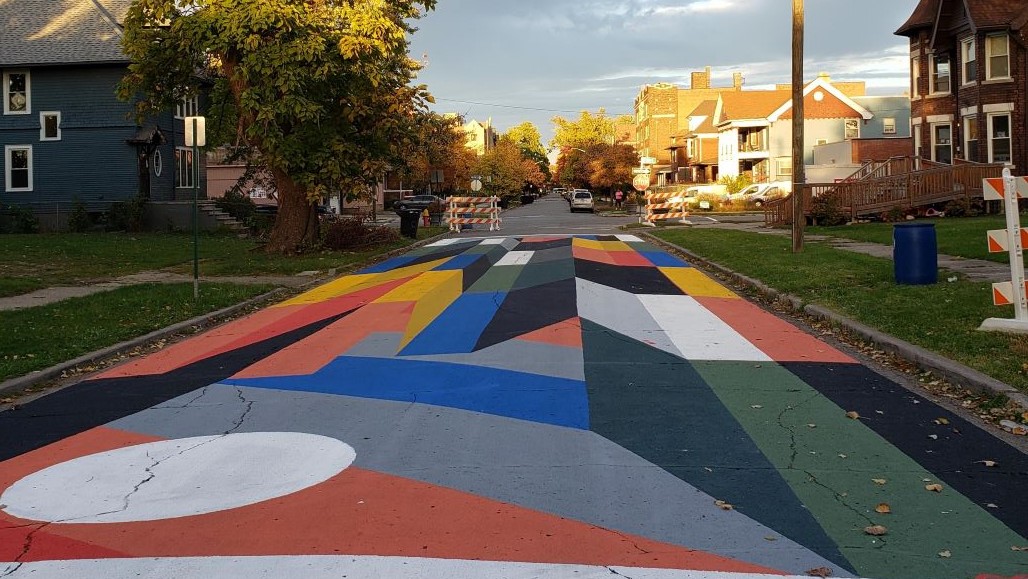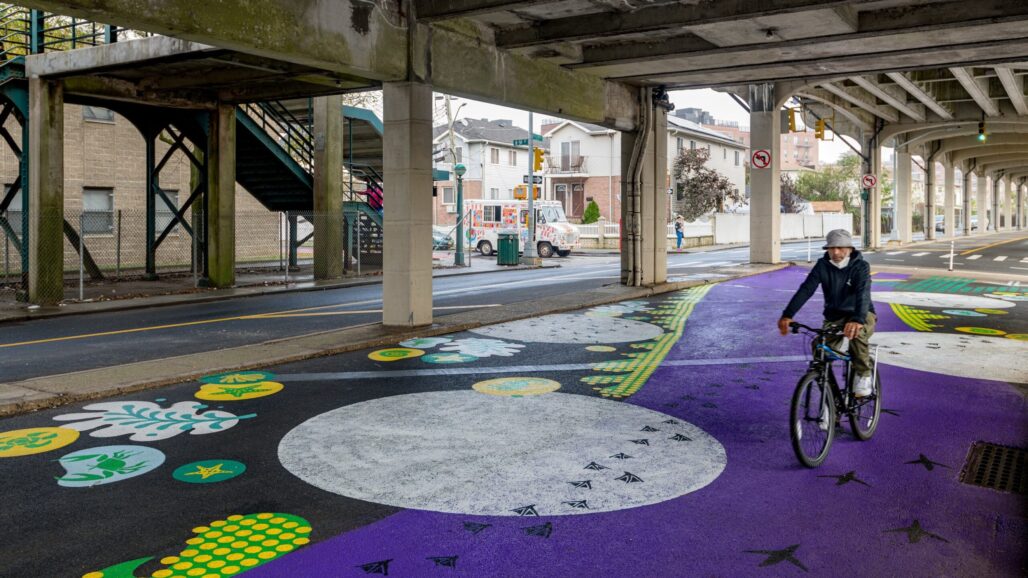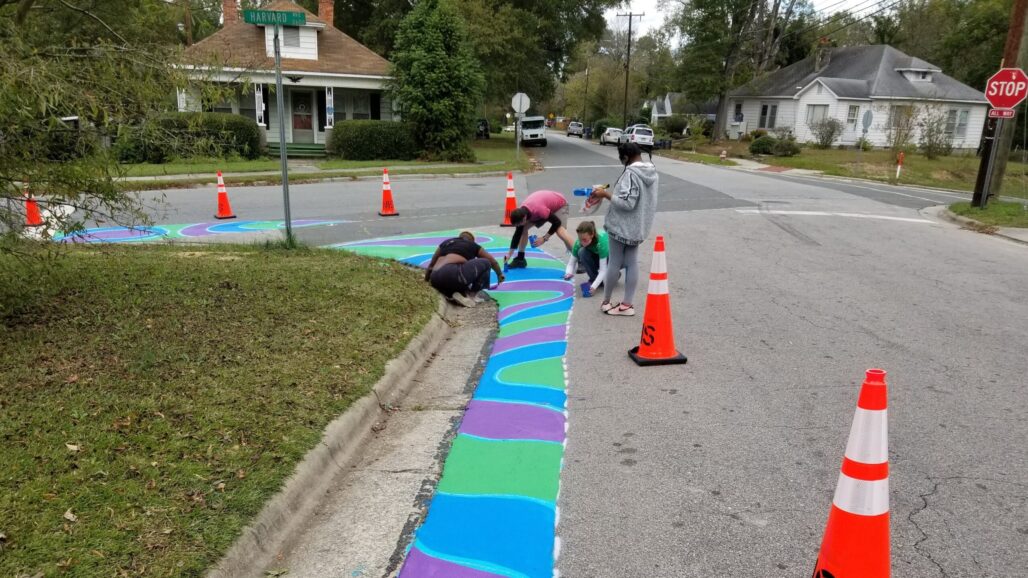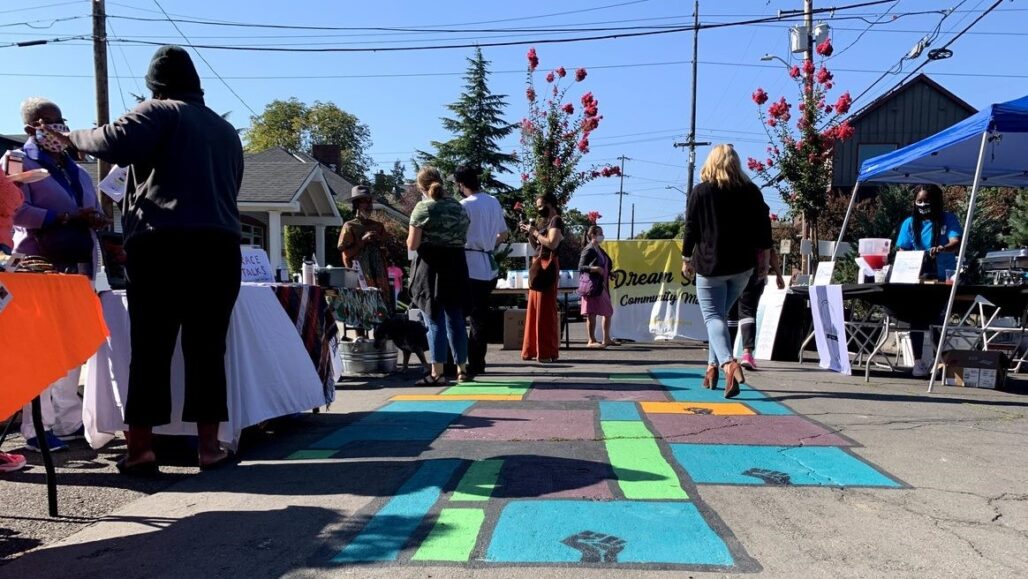Over 2020, as the demand for rapid response projects grew and city budgets shrank, NACTO launched a competitive grant opportunity to ten cities working to put the Streets for Pandemic Response and Recovery principles into action. We sought applications from city transportation agencies that, in partnership with community-based organizations, were reimagining streets, implementing ideas, and supporting ongoing community efforts that met the needs of populations disproportionately harmed by COVID-19.
Core to this program was the understanding that community partners play a critical role envisioning and implementing smart, equitable public projects and services. By working together, city agencies and community-based organizations are well poised to navigate the tension between the speed required for emergency pandemic response, and the thoughtfulness required to ensure that rapid project delivery doesn’t further perpetuate inequity or harm communities most in need of support.
Taken together, the selected projects fell into three broad categories, but all revolved around a central theme: enabling a shift in thinking about what issues community members face in this moment – and how cities can wield their power to help identify and address them.
Projects focused on:
Information sharing and service delivery: Retrofitting the right-of-way into public spaces or adapting existing community spaces to share information, program events, or increase access to services.
 Detroit partnered with Urban Neighborhood Initiatives (UNI) and Brilliant Detroit to temporarily close streets and establish outdoor hubs near schools and parks for local students to meet, learn, and play.
Detroit partnered with Urban Neighborhood Initiatives (UNI) and Brilliant Detroit to temporarily close streets and establish outdoor hubs near schools and parks for local students to meet, learn, and play.
 New York City partnered with Rockaway Initiative for Sustainability & Equity (RISE) to retrofit space under the elevated train as The Rockaway Wellness Way, an area where RISE can now do COVID-19 testing, information sharing, and food distribution.
New York City partnered with Rockaway Initiative for Sustainability & Equity (RISE) to retrofit space under the elevated train as The Rockaway Wellness Way, an area where RISE can now do COVID-19 testing, information sharing, and food distribution.
Traffic calming: Altering the design of the street to slow traffic and increase safety for residents.
 Durham partnered with SpiritHouse to engage residents in East Durham to envision safe Shared Streets / Calles Compartidas in their neighborhood. This led to the implementation of five Shared Streets / Calles Compartidas that, rather than simply being closed to through-traffic, also included traffic calming treatments like curb extensions and traffic circles that incorporate murals painted by the community.
Durham partnered with SpiritHouse to engage residents in East Durham to envision safe Shared Streets / Calles Compartidas in their neighborhood. This led to the implementation of five Shared Streets / Calles Compartidas that, rather than simply being closed to through-traffic, also included traffic calming treatments like curb extensions and traffic circles that incorporate murals painted by the community.
Local business support: Providing materials and technical support to help local businesses in specific neighborhoods.
 Portland partnered with the Soul District Business Association, Self Enhancement, Inc., and Albina Vision Trust to create Dream Street Plaza, an outdoor public market space for small businesses in Albina, a historically Black community in the city. Over the summer, partners incorporated public art from local Black artists into the space and hosted multiple weekend outdoor markets for local merchants. The plaza’s success launched a district-wide public art initiative led by Albina-based nonprofits.
Portland partnered with the Soul District Business Association, Self Enhancement, Inc., and Albina Vision Trust to create Dream Street Plaza, an outdoor public market space for small businesses in Albina, a historically Black community in the city. Over the summer, partners incorporated public art from local Black artists into the space and hosted multiple weekend outdoor markets for local merchants. The plaza’s success launched a district-wide public art initiative led by Albina-based nonprofits.
Lessons for Success
Though diverse in objectives, process, and location, a few overarching themes and lessons for success emerged from the grant projects.
Develop strong partnerships: Cities with existing partnerships with community-based organizations (CBOs) were able to hit the ground running at the start of the grant program. In these cities, avenues of collaboration were already established: CBOs trusted the city to listen and work to deliver on community needs, while cities knew how to navigate their bureaucratic processes and pull levers of power to realize these goals.
Listen: Cities without existing CBO partnerships had to start on the ground floor of relationship-building: they listened to their new partners, who are embedded in local communities and know their conditions, needs, and desires. Cities made space to hear from CBOs and the communities they represent, which helped determine project scope and, importantly, signal that the city valued both the CBO’s community expertise, as well as the expertise of the local community itself. This was fundamental to establishing trust and building a working relationship through this grant program (albeit on an accelerated timeline).
Define and align on goals: Even with a strong partner, it’s hard to work towards a goal without a shared understanding of what that goal is. At the project outset, many cities sat with community partners (whether preexisting or new) to reach agreement on project objectives, scope, timeline, roles and responsibilities. With a history of government exclusion or neglect for many local communities, this is a critical step. Co-creating goals establishes mutual trust and buy-in.
Stay flexible: As a result of their outreach work with CBOs, multiple cities adjusted projects over the course of the 3-month grant. Making the decision to tack in a new direction required cities to stay flexible and question their assumptions about community need. Whether adapting a tricky contracting process or installing traffic calming elements rather than open streets barriers, deep, direct engagement yielded a more nuanced understanding of community need while flexibility allowed cities to adjust project components to better deliver results.
Each city that participated in this grant program sought to build strong relationships with community-based organizations, empower local communities to have a say in what happens on and to their streets, and seek equity through process and product. Read more about each project’s goals, outcomes, and lessons learned in the final grant report, as well as NACTO’s takeaways for cities seeking to deliver projects with, instead of to, the communities they serve.
The Streets for Pandemic Response and Recovery grant program was made possible due to generous support from Bloomberg Philanthropies. As so often happens, what is successful in one city is shared and replicated across others in the NACTO network, adapted to the local context. We look forward to seeing how these lessons learned help cities use their most abundant assets—their streets—toward a just, equitable recovery.